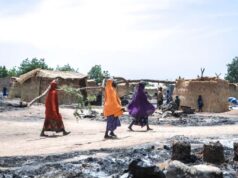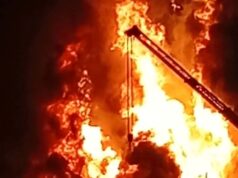July 5th, 2016 – The recent spate of jungle justice and mob attacks leading to the loss of lives and properties in parts of the country, such as the recent brutalization of a Federal Road Safety Official [1] and the destruction of several government owned transport buses (Bus Rapid Transit – BRT) in Lagos [2] state have presented a cause for reflection on the issue of jungle justice in Nigeria, its causes, and possible measure which authorities and stakeholders can explore to curb the incidence of mob attacks and unlawful execution of punishment on alleged wrong doers or offenders of crime in the country.
A poll conducted by NOIPolls in 2014, which sought the views of Nigerians on Jungle Justice / mob attack revealed that majority of Nigerians (51 percent) attributed the prevalence of jungle justice in the country to “lack of trust in the law enforcement agencies”. This was identified as the primary factor, with about 44 percent to 61 percent of respondents across all geo-political zones siting citizens’ distrust of law enforcement institutions and its official as the number one factor responsible for the prevalence of jungle justice / mob attacks. This was followed by 43 percent who blamed its prevalence on “illiteracy/lack of awareness of laws”.
In addition, the majority of Nigerians (94 percent) affirmed that there was a high prevalence of jungle justice/mob attack in Nigeria, describing it as “a wicked and barbaric act” (60 percent). More findings revealed that almost half (an alarming 43 percent) of the Nigerian population confirmed to have personally witnessed acts of jungle justice/mob attacks in their localities, while only 16 percent claimed to have had prior knowledge of a member of their community who fell victim to jungle justice/mob attack.
Excerpts of Findings from the NOIPolls opinion survey on jungle justice and mob attack in Nigeria.
Respondent to the poll were asked six specific questions. The first question sought the opinion of Nigerians regarding the occurrence of jungle justice or mob attacks. Respondents were asked: In your opinion, to what extent are acts of jungle justice or mob attacks prevalent in Nigeria? The overall majority (94 percent: 65 percent +29 percent) reported that acts of jungle justice or mob attack was prevalent in Nigeria, while only 6% of the respondents indicated that it is “not prevalent at all”.
Analysis according to geo-political zones revealed that all respondents from the North-East zone (100 percent) were of the opinion that acts of jungle justice/mob attacks were prevalent in the country. This was followed by the South-West zone with 94 percent while the North-West and the South-South zones recorded 93% each. In addition, the South-East zone had the highest (10 percent) proportion of respondents that said that it is “not prevalent at all.
Subsequently, in order to ascertain the disposition of Nigerians towards acts of jungle justice, respondents were asked: In your own words, how would you describe the acts of jungle justice or mob attack? Findings revealed varied responses. However, the majority (60 percent) described jungle justice or mob attacks as “a wicked and barbaric act”, while 19 percent described it as “people taking the law into their hands”. Furthermore, 5 percent said it is a “wrong act of punishment” and another 5 percent said “it is unjust and unlawful” also 4 percent said it is dehumanizing. On the contrary, a meager 4 percent had the view that “it is good sometimes in order to deter others” from criminal acts.
Furthermore, in trying to establish the proportion of Nigerians who have witnessed any act of Jungle justice/mob attacks, results revealed that almost half of Nigerians (an alarming 43 percent) had personally witnessed acts of jungle justice in their localities, while 57 percent had never been witnesses. It is noteworthy that more male Nigerians (49 percent) than females (36 percent) had been witnesses of jungle justice/ mob attack acts.
Further analysis across geo-political zones illustrated that the North-East and South-East zones had the same and highest proportions (50 percent) of respondents who had been witnesses of acts of jungle justice. This was followed by the North-Central zone with 45 percent.
Subsequently, respondents were asked: In your opinion, what are the factor(s) responsible for the prevalence of jungle justice or mob attacks in the country? Majority (51 percent) of Nigerians attributed the prevalence of jungle justice to a “lack of trust in law enforcement agencies” this is followed by 43 percent who blamed the prevalence to “illiteracy/lack of awareness of laws” and 26 percent of respondents who blame it on “lack of trust in the Nigerian judicial system”. Other factors included “the demand for quick criminal justice” 13 percent, “Religious/cultural beliefs” 8 percent and “Unemployment” 6 percent.
From the geo-political zone standpoint, the North-West zone (61 percent) accounts for the highest proportion of respondents that attributes the prevalence of jungle justice to “lack of trust on law enforcement agencies”. While the North-Central zone (53 percent) had the highest proportion that blamed the acts on “illiteracy/lack of awareness on laws” and the South-East zone (35 percent) had the highest proportion of respondents that blamed the prevalence on “lack of trust on the Nigerian judicial system.
Finally, respondents were asked: What measure(s) do you feel could be taken to curb the acts of jungle justice or mob attack in Nigeria? The overall majority (50 percent) suggested that in order to curtail jungle justice, more “awareness on the rule of law / constitution” should be created. This was followed by 37 percent of the respondents who suggested that there should be “highly effective law enforcement operatives” and 22 percent who advocate for “punishment for offenders”. In addition, while 20 percent of the respondents suggested “timely enforcement of laws”, a relatively small 4 percent thought that the creation of employment would curb the prevalence of jungle justice/mob attack in Nigeria.
Analysis based on geo-political zone revealed that the North-East zone (62 percent) had the highest proportion of Nigerians who suggested “awareness on the rule of laws / constitution” should be created while the North-East zone accounts for the highest proportion of respondents who advocated for “highly effective law enforcement operatives”. In addition, the highest proportion of respondents who advocated “punishment for offenders”, were from the North-West zone with 27 percent.
In conclusion, findings from the Jungle Justice poll established that there is a high prevalence of jungle justice/mob attack in Nigeria as affirmed by the majority of respondents (94 percent). Furthermore, 51 percent of Nigerians, representing the majority, attributed the prevalence of jungle justice to “lack of trust in the law enforcement agencies”, hence indicating a need for necessary steps and actions to be taken to reestablish and boost citizens trust in the nation’s law enforcement institutions and structures to provide justice when needed. Findings also revealed that half of adult Nigerians (50 percent) believe education and awareness of citizens on the rule of law / constitution will serve as a measure to curb the incidence of acts of jungle justice/mob attack in Nigeria.
Survey Methods
The opinion poll was conducted in January 20th to 22nd 2014. It involved telephone interviews of a random nationwide sample. 1,000 randomly selected phone-owning Nigerians aged 18 years and above, representing the six geopolitical zones in the country, were interviewed. With a sample of this size, we can say with 95% confidence that the results obtained are statistically precise – within a range of plus or minus 3%. NOIPolls Limited, No1 for country specific polling services in West Africa, which conducts periodic opinion polls and studies on various socio-economic and political issues in Nigeria. SOURCE NOIPolls









